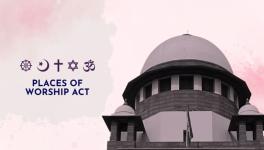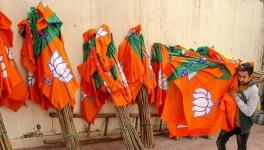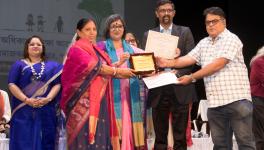WB: BJP Sceptical About Dividends From Ram Mandir Issue
Kolkata: Recent moves of the top brass of Bharatiya Janata Party (BJP) and its ideological parent Rashtriya Sawayamsevak Sangh (RSS), have raised doubts in sections of the civil society and enlightened political watchers whether BJP is becoming sceptical about the political dividend it has so far been confident of reaping from its ambitious Ayodhya Ram Mandir project which, according to organisers, will be a reality by December 2023, that is, some five months before the 2024 Lok Sabha elections.
The moves by the Sangh Parivar brass have been seen on the eve of the festive season. For the nearly three-week festive season, the BJP rank-and-file have been advised by the command chain to be socially active and come in contact with as many households as possible, particularly in rural and semi-urban areas and explain to them the welfare component of the BJP-led governments’ activity in the states and at the Centre, with emphasis on Narendra Modi’s initiatives.
The civil society members and political observers, in this context, refer to the meeting of RSS chief Mohan Bhagwat on September 22 with the chief imam of All India Imam Organisation, Umar Ahmed Ilyasi, at the latter’s residence in New Delhi. Bhagwat, accompanied by RSS functionaries Krishna Gopal, Ram Lal and Indresh Kumar, also met some madrasa students. The second move is the closed-door meeting the BJP president Jagat Prasad Nadda had a few days back on the premises of Caritas Hospital at Kottayam with Knanaya Catholic Archbishop Mathew Moolakkat and Metropolitan Archbishop of Changanassery Mar Joseph Perumthottam.
Seeking to find out the implications of these interactions, NewsClick spoke to the imam of Kolkata’s well-known Nakhoda Masjid Maulana Shafique Qasmi.
“A definite version of what transpired at the Bhagwat-Iliyas session is not available, but I can safely presume the two learned persons must have discussed issues, such as peace, communal harmony and inclusive welfare, which are crying needs of the moment," Qasmi told NewsClick.
Qasmi referred to the meeting between Bhagwat and Jamiat-Ulema-e-Hind head Maulana Syed Arshad Madani in New Delhi on August 30, 2019. Organised by BJP’s general secretary (organisation) Ram Lal, it was held at the Sangh office at Keshav Kunj. The timing was significant – the Assam NRC list was due for release in a few days.
But the chairman of Bengal Imams Association, Mohammed Yahiya, is not prepared to read much significance in the Bhagwat-Ilyasi meeting as the organisation Ilyasi heads does not have an all-India presence “in West Bengal, it is non-existent.”
It is known to be a pro-RSS outfit. Political gains for BJP, in this case, can’t be automatic. A third view is that it is part of the Sangh chief’s outreach programme, and it does have some optical value, as the interaction with Madani, which was the first ever, had.
As for Nadda’s meeting with two Catholic archbishops, knowledgeable quarters told NewsClick it is an effort on Nadda’s part to woo the Catholics, who constitute a visible vote bank, to the party’s side. A Kottayam datelined report in The Hindu on September 28 said in this context, “While both the Church and the BJP leadership have remained tightlipped ..... official sources attribute the development to the proposed formation of a BJP-backed Christian organisation in Kerala.”
The next Lok Sabha elections are 18 months away, yet the BJP brass has already started making the next General election part of the political narrative and its strategy exercises. The reason: Political analysts and learned civil society members attribute it to the party’s feeling of uncertainty over the political gains from the Ayodhya Ram Mandir construction because of the persisting economic hardships that people have been contending with for a long time.
Complicating matters for BJP is the uncertain outlook for sustainable recovery and relief for the common people. The reverberations of the Ukraine-Russia face-off and the latest signs of uncertainty surfacing in China cannot be ignored. On the domestic front, inflation has hurt large sections of the population; every item of daily consumption – milk, curd, vegetables, eggs, bread, and foodgrains – is dearer by some 20%. Costly fuels and state governments’ reluctance to reduce VAT on petrol and diesel have thrown public transport out of gear, and fares for whatever skeleton services are there have been marked up by 30-35%.
Job generation is a major concern, and estimates released by the Centre for Monitoring Indian Economy (CMIE) do not hold any promise. The rupee continues to fall, and a decline in forex is being repeatedly predicted. The consumption cycle has been disrupted, and early sustainable recovery is not on the horizon, sources told NewsClick.
The BJP leadership is slowly coming to terms with the ground realities, hence its doubts over Ayodhya Ram Temple automatically being a highly paying proposition. The sources identified West Bengal and large areas in the North-East with a concentration of Muslims and Christians.
BJP’s Lok Sabha member from Jalpaiguri, Dr Jayanta Kumar Roy, told NewsClick, “I tend to agree with you that my party may not gain from the Ram mandir issue in West Bengal, where voting is invariably on bread and butter issues and socially-relevant themes. Religion is not a factor in my state. But, I am optimistic about the party earning political dividends in other parts of the country as Lord Ram is revered for his concept of sushasan and inclusive welfarism. For us, misgovernance by Mamata Banerjee’s party and rampant corruption are major issues in West Bengal, and we will try hard to capitalise on those issues. You can’t deny that the state’s economy is in bad shape with the government neck-deep in debt.”
In the light of the assessment there won’t be many takers of Ayodhya in West Bengal, BJP will go all out to implement the Citizenship (Amendment) Act 2019 and secure the support of the Matua community, whose members had migrated in the wake of the Partition in 1947 from then East Pakistan and present-day Bangladesh to West Bengal [and even in some other states in relatively small numbers].
Yahiya seemed to suggest that gross economic mismanagement by the Modi government and the disruptive impact on people’s lives have dented BJP’s vote bank.
“Political acceptance of BJP is at an all-time low.”
The media keeps Modi and his party in the limelight in self-interest. During the Congress-led UPA regime, the media was outspoken, and the democratic fabric had not been weakened by the media then.
Asked about West Bengal, Yahiya told NewsClick, “You have in mind the corruption cases and recovery of huge cash being aired on the electric media. But, let me tell you, corruption has been institutionalised, which is not an issue with the electorate.”
From a rather cryptic observation, it appeared Yahiya expects some positive outcome from Congress’s Bharat Jodo Yatra.
Interestingly, RSS prant krayavah in West Bengal, Jishnu Basu, is least bothered about whether Ayodhya Ram Mandir yields electoral gains to BJP. To Basu, a much greater concern in West Bengal is persisting criminalisation of politics and the dwindling Hindu population in certain districts, particularly North 24 Parganas and South 24 Parganas. RSS is adhering to its programme, and there has been a fairly large increase in the number of pracharaks here, he informed NewsClick.
A political move that deserves mention is that Arvind Kejriwal’s Aam Aadmi Party set up on September 25 its West Bengal office, and state in-charge Sanjay Basu said on the occasion that AAP would chart its own in the state.
Meanwhile, the Bangladesh Hindu Bouddha Christian Aikya Parishad (unity council) has firmed up a programme for a 12-hour protest and fasting on October 22 in Dhaka in support of its charter of demands, some of which easily connect with India and deserve mention because the unity council, in principle, does not favour India’s CAA 2019.
This will follow a programme the organisation held on July 16. The main demands, as seen from a statement issued by the outfit and made available to NewsClick by its joint general secretary Monindra Kumar Nath, are:
*Formation of a permanent commission for minorities
*Proper implementation of the peace accord for the hills and a land commission Act for the hills;
*Setting up of a separate land commission for Adivasis living in the plains
*Enactment for the preservation of ‘Debottar’ property (property considered as belonging to a deity);
*Enactment for ending all kinds of discrimination against minorities.
Speaking to a visiting team of Indian journalists in Dhaka in the second week of June, Nath had even said, ideally, they would prefer a separate ministry for minorities.
India has a separate ministry for minority affairs. Also, India has institutional arrangements, as part of a provision in the Constitution, for hill people and scheduled castes and scheduled tribes.
But, they believe that an enactment, such as CAA, is not helpful. Many minorities under the fold of the unity council are from Bangladesh and want to remain as part of Bangladesh; certain problems notwithstanding. “There is no question of our leaving our country and living in a neighbouring country. Whatever problems we face, we will organise ourselves and get the problems resolved by the Bangladesh government.” This is the unity council’s stated and reiterated position.
The unity council has noted that these demands remain unfulfilled, although the Jatiya Sansad (Bangladesh's unicameral national legislature) is nearing four years of its five-year term. It has recorded its strong disapproval of the controversial remarks about Prophet Muhammed made in a TV debate towards the end of May by then BJP spokesperson Nupur Sharma. It has welcomed the strong stance of India’s Supreme Court on the axed spokesperson’s remarks.
Get the latest reports & analysis with people's perspective on Protests, movements & deep analytical videos, discussions of the current affairs in your Telegram app. Subscribe to NewsClick's Telegram channel & get Real-Time updates on stories, as they get published on our website.























